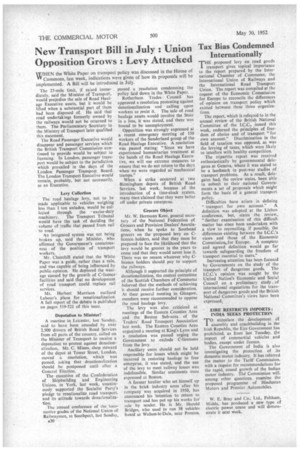New Transport Bill in July : Union Opposition Grows : Levy Attacked
Page 32

If you've noticed an error in this article please click here to report it so we can fix it.
WHEN the White Paper on transport policy was discussed in the House of Commons, last week, indications were given of how its proposals will be implemented. A Bill will be introduced in July.
The 25-mile limit, if raised immediately, said the Minister of Transport, would prejudice the sale of Road Haulage Executive assets, but it would be lifted when a substantial part of them had been disposed of. He said that road undertakings formerly owned by the railways would not be returned to them. The Parliamentary Secretary to the Ministry of Transport later qualified this statement.
The Road Passenger Executive would disappear and passenger services which the British Transport Commission continued to provide would be subject to licensing. In London, passenger transport would be subject to the jurisdiction which prevailed in the days of the London Passenger Transport Board. The London Transport Executive would remain, probably, but not necessarily, as an Executive.
Levy Collection The road haulage levy, not to be made applicable to vehicles weighing less than 1 ton unladen, would be collected through the excise-duty machinery. The Transport Tribunal would have the task of deciding the volume of traffic that passed from rail to road.
An integrated system was not being broken up, said the Minister, who affirmed the Government's consciousness of the position of transport workers.
Mr. Churchill stared that the White Paper was a guide, rather than a rule, and was capable of being influenced by public opinion. He deplored the wastage caused by the growth of C-licence facilities and said that no development of road transport could replace rail services.
Mr. Herbert Morrison outlined Labour's plans for renationalizatiori. A full report of the debrite is published on pages 519-521 of this issue.
Deputation to Minister?
A meeting in Leicester, last Sunday, said to have been attended by over 2,500 drivers of British Road Services from all parts of the country, called on the Minister of Transport to receive a deputation to protest against denationalization, Mr. C. Minns, shop steward of the depot at Tower Street, London, moved a resolution, which was passed, asking that denationalization should be postponed until after a General Election.
The executive of the Confederation of Shipbuilding and Engineering Unions, in York, last week, unanimously supported the Socialist Party's pledge to renationalize road transport, and its attitude towards denationalization.
The annual conference of the locomotive grades of the National Union of Railwaymen, at Southport, last Sunday,
A30 passed a resolution condemning the policy laid down in the White Paper.
Rotherham Trades Council . has approved a resolution protesting against denationalization and calling upon workers to resist it. The sale of road haulage assets would involve the State in a loss, it was stated, and there was bound to be unemployment.
Opposition was strongly expressed at a recent emergency meeting of 150 workers of the Sunderland group of the Road Haulage Executive. A resolution was passed stating: "Since we have experienced humanitarian treatment at the hands of the Road Haulage Executive, we will use extreme measures to ensure that we do not return to the days when we were regarded as mechanical tramps."
When a strike occurred at two Birmingham depots of British Road Services, last week, because of the introduction of a time-clock system, many men claimed that they were better off under private enterprise.
Grocers Object
Mr. W. Hermann Kent, general secretary of the National Federation of Grocers and Provision Dealers' Associations, when he spoke to Southend grocers on the proposed levy on Clicence holders, said that they must be prepared to face the likelihood that the levy would be greater in the years to come and that they would never lose it. There was no reason whatever why Clicence holders should pay to support the railways.
Although it supported the principle of denationalization, the central committee of the Scottish Chambers of Commerce believed that the methods of achieving it should receive further consideration. At their general meeting in Glasgow, members were recommended to oppose the road haulage levy.
The levy was also criticized at meetings of the Eastern Counties Area and the Boston Sub-area of the Traders' Road Transport Association last week. The Eastern Counties Area organized a meeting at King's Lynn and a resolution was passed urging the Government to exclude C-licensees from the levy.
Ancillary users should not be held responsible for losses which might be incurred in restoring haulage to free enterprise, it was stated, and the use of the levy to meet railway losses was indefensible. Similar sentiments were expressed at Boston.
A former haulier who set himself up in the brick industry soon after his company was acquired in 1950, has announced his intention to return to transport and has put up his works for sale by tender. He is Mr. Harold Bridges, who used to run 38 vehicles based at Walton-le-Dale, near Preston.




























































































